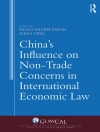This book explores how the Baltic States have adapted to, and been embedded in, a wider European environment and how they have become modern European states. It focuses on changes in the policies, politics and administrative practices that have taken place after 1991 in Estonia, Latvia and Lithuania, and on the influence of rules and ideas in the European Union. The authors investigate the meeting between national traditions, rule-making and practices – on the one hand; and traditions, rule-making and practices connected to the European Union – on the other. Drawing on organization theory, and the image of states as complex and fragmented organizations, this book discusses: The forms of governance that are directed towards states, differentiating between regulative, inquisitive and meditative activities. The logic of appropriateness and the scriptedness of states. To what extent do the states have to follow the rules, and to what extent are they able to do what they want themselves? Adaptation processes in the state organizations. This book examines how European integration prompts and accelerates new forms of governance in Europe; it will be of interest to students and scholars of politics, the European Union and the Baltic states.
Bengt Jacobsson
European Union and the Baltic States [PDF ebook]
Changing forms of governance
European Union and the Baltic States [PDF ebook]
Changing forms of governance
Mua cuốn sách điện tử này và nhận thêm 1 cuốn MIỄN PHÍ!
Ngôn ngữ Anh ● định dạng PDF ● Trang 208 ● ISBN 9781135211912 ● Biên tập viên Bengt Jacobsson ● Nhà xuất bản Taylor and Francis ● Được phát hành 2009 ● Có thể tải xuống 3 lần ● Tiền tệ EUR ● TÔI 4493091 ● Sao chép bảo vệ Adobe DRM
Yêu cầu trình đọc ebook có khả năng DRM












